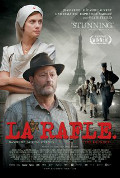
France/Germany/Hungary 2010
Directed by
Rose Bosch
115 minutes
Rated MA
Reviewed by
Bernard Hemingway

Rafle, La
Synopsis: An account of the infamous Vel' d'Hiver round-up on July 16th 1942 of 13.000 Parisian Jews, virtually all of whom would eventually perish in Nazi concentration camps
La Rafle deals with the same subject matter as Sarah’s Key, which was released here in late 2010 to reasonable success. Although for some, it may be six of one, half a dozen of the other, for me this is the better film and hopefully there is still an audience for it (it was a hit in France). Unlike the latter film, La Rafle is presented entirely as a historical recreation. Indeed it makes it very clear that fidelity to the actuality of events is its main agenda. This is both an advantage and a disadvantage. Whereas the earlier film launched straight into the round-up, La Rafle spends a good while setting up the situation. It shows us the political shenanigans involved in the Vichy decision to comply with the Nazi occupiers and the daily lives of the people who are about to become its victims. As a result we see a plethora of characters in a tableaux-like setting without any decisive character identification as we had with Sarah’s Key which foregrounded Sarah and Kristen Scott Thomas as the journalist on her trail and made that the main narrative drive.
The film keeps quite faithfully to its mission of giving us a lesson in history with only Jean Reno and Mélanie Laurent emerging as dramatis personae. Presumably developed for purely entertainment value this aspect has far less claim on veracity. Laurent makes for a typically winsome nurse (she is no fan of the Christian Bale school of weight loss, however, and although her character is supposed to have lost 14 pounds she doesn’t do much more than change her makeup) whilst Reno is engaging, albeit an unlikely casting choice, as a self-sacrificing medico.
Whilst the film is impressive in its fastidious attention to detail and the section in the Vel' d'Hiver, particularly so in this respect, Bosch perhaps overplays her hand is in the opposition between the guileless Jewish citizenry and the ruthless brutal Nazis and their French collaborators. Unquestionably the round-up was a shameful act and the film succeeds in bringing that home but it feels at times too ingenuously manipulative in its claim to be telling things as they were. Probably the most insistent example of this is a cute, curley headed boy, the youngest member of the main family depicted who, as it were, stands for childhood innocence and who chimes in periodically throughout the proceedings with some endearing utterance before being trained off to Poland where we are told by the end credits all the children died. So how does he manage to be reunited with Laurent’s nurse in a teary recontre at the end of the film?
Film, of necessity, puts a gloss on real life and La Rafle, despite its claims to historical validation, is more than a little glossy for its subject.

Want more about this film?


Want something different?




